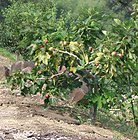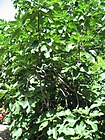Note: This is a project under development. The articles on this wiki are just being initiated and broadly incomplete. You can Help creating new pages.
Difference between revisions of "Ficus carica"
| Line 1: | Line 1: | ||
[[Image:FicusCarica.jpg|thumb|right]] | [[Image:FicusCarica.jpg|thumb|right]] | ||
| − | '''Ficus carica''' is a deciduous shrubs or trees with open, spreading crowns. It grows upto 5 - 10 metres tall. | + | '''Ficus carica''' is a deciduous shrubs or trees with open, spreading crowns. It grows upto 5 - 10 metres tall. It is very popular fruit, widely available for sale in countries around the world. The tree is very widely cultivated in many regions of the world, from warm temperate to tropical for its fruit. |
==Uses== | ==Uses== | ||
{{Uses|Swollen piles}}, {{Uses|Corns}}, {{Uses|Warts}}, {{Uses|gumboils}}, {{Uses|dental abscesses}}.<ref name="Uses"/> | {{Uses|Swollen piles}}, {{Uses|Corns}}, {{Uses|Warts}}, {{Uses|gumboils}}, {{Uses|dental abscesses}}.<ref name="Uses"/> | ||
Revision as of 14:53, 7 May 2020
Ficus carica is a deciduous shrubs or trees with open, spreading crowns. It grows upto 5 - 10 metres tall. It is very popular fruit, widely available for sale in countries around the world. The tree is very widely cultivated in many regions of the world, from warm temperate to tropical for its fruit.
Contents
- 1 Uses
- 2 Parts Used
- 3 Chemical Composition
- 4 Common names
- 5 Properties
- 6 Habit
- 7 Identification
- 8 List of Ayurvedic medicine in which the herb is used
- 9 Where to get the saplings
- 10 Mode of Propagation
- 11 How to plant/cultivate
- 12 Commonly seen growing in areas
- 13 Photo Gallery
- 14 References
- 15 External Links
Uses
Swollen piles, Corns, Warts, gumboils, dental abscesses.[1]
Parts Used
Chemical Composition
It contains many bioactive compounds including volatiles, organic acids, phytosterols, triterpenoids, fatty acids, phenolic acids, flavonoids,[2]
Common names
| Language | Common name |
|---|---|
| Kannada | |
| Hindi | |
| Malayalam | |
| Tamil | |
| Telugu | |
| Marathi | |
| Gujarathi | |
| Punjabi | |
| Kashmiri | |
| Sanskrit | |
| English |
Properties
Reference: Dravya - Substance, Rasa - Taste, Guna - Qualities, Veerya - Potency, Vipaka - Post-digesion effect, Karma - Pharmacological activity, Prabhava - Therepeutics.
Dravya
Rasa
Guna
Veerya
Vipaka
Karma
Prabhava
Habit
Identification
Leaf
| Kind | Shape | Feature |
|---|---|---|
Flower
| Type | Size | Color and composition | Stamen | More information |
|---|---|---|---|---|
| {{{5}}} |
Fruit
| Type | Size | Mass | Appearance | Seeds | More information |
|---|---|---|---|---|---|
Other features
List of Ayurvedic medicine in which the herb is used
Where to get the saplings
Mode of Propagation
Seeds, Cuttings of mature wood, Air layering.
How to plant/cultivate
Figs are plants of temperate and subtropical climates. They do not generally grow well in the wet tropics, but can be grown at higher elevations in the drier to moist tropics.[4]
Commonly seen growing in areas
Amongst rocks, In woods, Hot dry soils.
Photo Gallery
References
External Links
- Ayurvedic Herbs known to be helpful to treat Swollen piles
- Ayurvedic Herbs known to be helpful to treat Corns
- Ayurvedic Herbs known to be helpful to treat Warts
- Ayurvedic Herbs known to be helpful to treat gumboils
- Ayurvedic Herbs known to be helpful to treat dental abscesses
- Herbs with Fruits used in medicine
- Habit - Deciduous tree
- Index of Plants which can be propagated by Seeds
- Index of Plants which can be propagated by Cuttings of mature wood
- Index of Plants which can be propagated by Air layering
- Herbs that are commonly seen in the region of Amongst rocks
- Herbs that are commonly seen in the region of In woods
- Herbs that are commonly seen in the region of Hot dry soils
- Herbs
- Pages without herbs images








